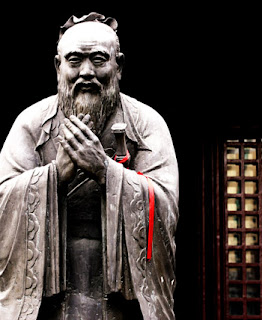 |
| Confucius (Google Image) |
By Terry Orr
Confucius
(551–479 BCE) was a Chinese teacher, editor, politician, and philosopher of the
Spring and Autumn Period of Chinese history. The philosophy of Confucius
emphasized personal and governmental morality, correctness of social
relationships, justice and sincerity. His followers competed successfully with
many other schools during the Hundred Schools of Thought era only to be
suppressed in favor of the Legalists during the Qin Dynasty. Following the
victory of Han over Chu after the collapse of Qin, Confucius's thoughts
received official sanction and were further developed into a system known as Confucianism.
(Wikipedia)
 |
| (Google Image) |
Better
known in China as “Master Kong” (Chinese: Kongzi), Confucius was a
fifth-century BCE Chinese thinker whose influence upon East Asian intellectual
and social history is immeasurable. As a culturally symbolic figure, he has
been alternately idealized, deified, dismissed, vilified, and rehabilitated
over the millennia by both Asian and non-Asian thinkers and regimes. Given his
extraordinary impact on Chinese, Korean, Japanese, and Vietnamese thought, it
is ironic that so little can be known about Confucius. (IEP)
 |
| (Google Image) |
The Top 10 Wise
Confucius Quotes:
- “Never impose on others what you would not choose for yourself.”
- “Real knowledge is to know the extent of one’s ignorance.”
- “I hear and I forget. I see and I remember. I do and I understand.”
- “Everything has beauty, but not everyone sees it.”
- “The Superior Man is aware of Righteousness, the inferior man is aware of advantage.”
- “Wheresoever you go, go with all your heart.”
- “Our greatest glory is not in never falling, but in getting up every time we do.”
- “He who learns but does not think, is lost. He who thinks but does not learn is in great danger.”
- “He that would perfect his work must first sharpen his tools.”
- “If you look into your own heart, and you find nothing wrong there, what is there to worry about? What is there to fear?”
 |
| (Google Image) |
In
closing this article – it seems appropriate to include this paragraph from last
year’s article in the mist of our upcoming elections. Confucius' political thought is based upon his ethical
thought. He argues that the best government is one that rules through
"rites" (lǐ) and people's natural morality, rather than by using
bribery and coercion. He explained that this is one of the most important
analects: "If the people be led by laws, and uniformity sought to be given
them by punishments, they will try to avoid the punishment, but have no sense
of shame. If they be led by virtue, and uniformity sought to be given them by
the rules of propriety, they will have the sense of the shame, and moreover
will become good."
 |
| The tomb of Confucius in China. Photo by Rolf Müller |
References
and Links:




No comments:
Post a Comment